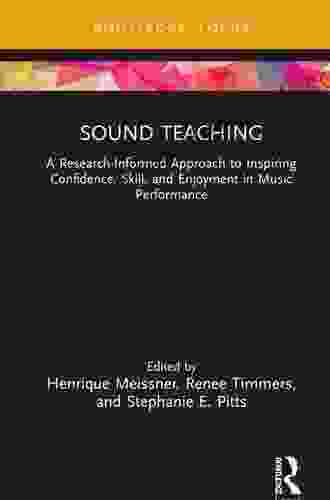A Research-Informed Approach to Inspiring Confidence, Skill, and Enjoyment in Music

Music is a powerful force in our lives. It can bring joy, comfort, and inspiration. It can also help us learn, grow, and connect with others. For children, music can be a particularly important part of their development. It can help them develop their language skills, their coordination, and their creativity. It can also help them learn about different cultures and express themselves emotionally.
4.2 out of 5
| Language | : | English |
| File size | : | 3207 KB |
| Text-to-Speech | : | Enabled |
| Screen Reader | : | Supported |
| Enhanced typesetting | : | Enabled |
| Word Wise | : | Enabled |
| Print length | : | 158 pages |
However, for many children, music can also be a source of anxiety and frustration. They may feel like they are not good enough or that they are not able to learn how to play. This can lead them to give up on music altogether or to never reach their full potential.
This is where a research-informed approach can be helpful. By understanding the research on how children learn music, we can create teaching methods and learning environments that are more likely to inspire confidence, skill, and enjoyment in music.
The Importance of a Positive Learning Environment
One of the most important factors in inspiring confidence, skill, and enjoyment in music is creating a positive learning environment. This means providing children with a safe and supportive space where they feel comfortable taking risks and making mistakes. It also means giving them opportunities to succeed and to receive positive feedback from their teachers and peers.
There are a number of things that teachers can do to create a positive learning environment for music. These include:
- Using positive language. When talking to children about their music, always use positive language. Avoid using negative words or phrases, such as "wrong" or "bad." Instead, focus on what the child is ng well and offer praise for their efforts.
- Providing opportunities for success. Give children opportunities to succeed in their music lessons. This means starting with easy songs and activities and gradually increasing the difficulty as they progress. It also means giving children plenty of opportunities to practice and perform.
- Giving positive feedback. When children do something well, make sure to give them positive feedback. This could be a verbal compliment, a written note, or a small reward. Positive feedback helps children to feel good about their music and motivates them to continue learning.
- Creating a supportive community. Music is a social activity, and it is important to create a supportive community in your music classroom. This means encouraging children to help and support each other, and providing opportunities for them to perform together.
The Importance of Skill Development
In addition to creating a positive learning environment, it is also important to help children develop their musical skills. This includes teaching them basic music theory, such as pitch, rhythm, and harmony. It also includes teaching them how to play an instrument or sing.
There are a number of different ways to teach musical skills. Some teachers prefer to use a more traditional approach, which involves teaching children music theory and technique in a step-by-step manner. Other teachers prefer to use a more creative approach, which involves using games, songs, and activities to teach children musical concepts.
The best approach for teaching musical skills will vary depending on the age and ability level of the children. However, there are some general principles that all teachers should keep in mind. These include:
- Starting with the basics. When teaching musical skills, it is important to start with the basics. This means teaching children about pitch, rhythm, and harmony before moving on to more complex concepts.
- Providing opportunities for practice. Children need to practice their musical skills in order to improve. This means giving them plenty of opportunities to practice at home and in class.
- Giving feedback. When children practice their musical skills, it is important to give them feedback on their progress. This feedback should be specific and actionable, so that children know what they need to do to improve.
- Making learning fun. Learning musical skills should be fun for children. This means using games, songs, and activities to make learning more engaging.
The Importance of Enjoyment
In addition to creating a positive learning environment and teaching children musical skills, it is also important to make sure that children enjoy their music lessons. This means finding activities that they enjoy and that are appropriate for their age and ability level. It also means allowing children to explore their own musical interests and to express themselves creatively.
There are a number of things that teachers can do to make music lessons more enjoyable for children. These include:
- Using a variety of activities. Music lessons should be varied and engaging. This means using a variety of activities, such as singing, playing instruments, listening to music, and moving to music.
- Allowing children to choose their own music. Children are more likely to enjoy music lessons if they are allowed to choose their own music. This could mean allowing them to choose songs to sing or play, or to choose their own instruments.
- Encouraging children to express themselves creatively. Music is a great way for children to express themselves creatively. Encourage children to create their own songs, dances, and compositions.
- Making learning fun. Learning music should be fun for children. This means using games, songs, and activities to make learning more engaging.
By following these research-informed principles, teachers can create music lessons that are positive, engaging, and enjoyable for children. This will help children to develop their confidence, skill, and enjoyment in music, and to reach their full musical potential.
References
- Berliner, P. (2001). How Children Learn Music . Oxford University Press.
- Deliege, C., & Sloboda, J. A. (2013). Musical Beginnings: Origins and Development of Musical Competence
4.2 out of 5
| Language | : | English |
| File size | : | 3207 KB |
| Text-to-Speech | : | Enabled |
| Screen Reader | : | Supported |
| Enhanced typesetting | : | Enabled |
| Word Wise | : | Enabled |
| Print length | : | 158 pages |
Do you want to contribute by writing guest posts on this blog?
Please contact us and send us a resume of previous articles that you have written.
 Book
Book Novel
Novel Page
Page Text
Text Reader
Reader E-book
E-book Newspaper
Newspaper Paragraph
Paragraph Sentence
Sentence Bookmark
Bookmark Shelf
Shelf Glossary
Glossary Synopsis
Synopsis Footnote
Footnote Scroll
Scroll Codex
Codex Classics
Classics Library card
Library card Narrative
Narrative Memoir
Memoir Reference
Reference Character
Character Librarian
Librarian Catalog
Catalog Card Catalog
Card Catalog Archives
Archives Periodicals
Periodicals Study
Study Research
Research Lending
Lending Reserve
Reserve Journals
Journals Reading Room
Reading Room Rare Books
Rare Books Study Group
Study Group Thesis
Thesis Dissertation
Dissertation Awards
Awards Book Club
Book Club Theory
Theory Courtney Carbone
Courtney Carbone Peter Bart
Peter Bart Murphy Daley
Murphy Daley Patricia Davids
Patricia Davids Amanda Smith
Amanda Smith Ekaterina Dorozhkina
Ekaterina Dorozhkina Hannes Adomeit
Hannes Adomeit Erin Stanton
Erin Stanton Mariana Budjeryn
Mariana Budjeryn Patricia Bell Scott
Patricia Bell Scott Air Herk
Air Herk Adam Ockelford
Adam Ockelford M Nowak
M Nowak Rich Gorecki
Rich Gorecki Lea Wait
Lea Wait Sherman Lewis
Sherman Lewis Peter Wells
Peter Wells Dottie Raymer
Dottie Raymer Misa Saburi
Misa Saburi Phil M Jones
Phil M Jones
Light bulbAdvertise smarter! Our strategic ad space ensures maximum exposure. Reserve your spot today!

 Cruz SimmonsExploring the Enchanting West Coast States: A Comprehensive Guide by Adrian...
Cruz SimmonsExploring the Enchanting West Coast States: A Comprehensive Guide by Adrian...
 Leo MitchellHealing Journey Of Love Loss And Renewal: A Profound Exploration of Grief,...
Leo MitchellHealing Journey Of Love Loss And Renewal: A Profound Exploration of Grief,...
 Caleb CarterThe Don Freak Out Guide to Parenting Kids with Asperger's: A Comprehensive...
Caleb CarterThe Don Freak Out Guide to Parenting Kids with Asperger's: A Comprehensive... Simon MitchellFollow ·2.7k
Simon MitchellFollow ·2.7k Christian BarnesFollow ·17.3k
Christian BarnesFollow ·17.3k Cooper BellFollow ·6k
Cooper BellFollow ·6k Gustavo CoxFollow ·16.6k
Gustavo CoxFollow ·16.6k Roy BellFollow ·8.3k
Roy BellFollow ·8.3k Adrien BlairFollow ·19.6k
Adrien BlairFollow ·19.6k Edgar Allan PoeFollow ·6.4k
Edgar Allan PoeFollow ·6.4k Billy FosterFollow ·4.7k
Billy FosterFollow ·4.7k

 H.G. Wells
H.G. WellsAnalyzing Sensory Data With Chapman Hall Crc The Series:...
Sensory data...

 Garrett Bell
Garrett BellThe Devil in the Flesh: A Haunting Tale from the Depths...
Nestled amidst the...

 Quentin Powell
Quentin PowellThe Art of Love: A Journey into Intimacy, Desire, and the...
Love is one of the most...

 Bobby Howard
Bobby HowardRV Inspection Deal Breakers: A Comprehensive Guide to...
Purchasing a recreational vehicle (RV)...

 Jordan Blair
Jordan BlairLong Way Home: A Journey Through the Piano and Vocal...
The piano and vocal chords are two of...
4.2 out of 5
| Language | : | English |
| File size | : | 3207 KB |
| Text-to-Speech | : | Enabled |
| Screen Reader | : | Supported |
| Enhanced typesetting | : | Enabled |
| Word Wise | : | Enabled |
| Print length | : | 158 pages |








